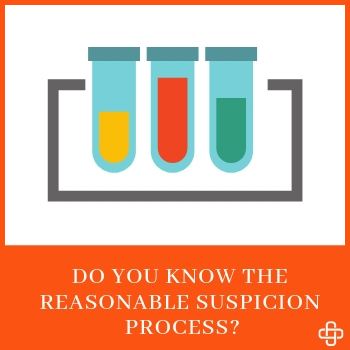 Have you ever had a hunch an employee was under the influence of drugs or alcohol but you weren’t quite sure how to act on it?
Have you ever had a hunch an employee was under the influence of drugs or alcohol but you weren’t quite sure how to act on it?
According to the The National Clearinghouse for Alcohol and Drug Information, employers lose $100 billion a year due to substance abuse alone.
This can come in the form of absenteeism, tardiness, poor judgement and injuries.
Cut the risk out by taking a ‘preventative interception’ measure with reasonable suspicion testing!
Read on to learn how easy the process is, and what a game changer it can be for your business.
Consider Drug Testing To Be ‘Preventative Interception’
Take a look how James handled his employee’s suspicious behavior:
As Randy had returned to the warehouse to restock his delivery truck, James encountered him in the hallway.
“Something seems off,” he thought. He studied his behavior for a minute and immediately noticed the employee’s bloodshot eyes and disoriented behavior.
Knowing these changes were not consistent with the employee’s typical appearance and behavior, James had a feeling Randy might have been working his shift under the influence of drugs or alcohol.
He immediately set up a test which confirmed his suspicion: Randy tested positive for marijuana.
Employers must start thinking of reasonable cause testing as a important preventative measure for any organization, and for three main reasons:
- it can save a serious accident from occurring at work;
- allow an addicted employee to receive the help they need;
- and/or provide a safe workplace for everyone.
Do You Know How The Reasonable Suspicion Process Works?
Reasonable suspicion testing requirements are designed to keep impaired employees from injuring themselves or others. The process includes five steps:
Step 1: Observe
You witness unusual characteristics or behaviors by an employee you supervise.
Step 2: Confirm
Confirm the employee’s behavior, appearance, speech or body odor is consistent with signs or symptoms of alcohol or drug impairment.
Step 3: Document
Objectively document your observations of the employee’s behavior, appearance, speech or body odor.
Step 4: Confront
Address your observations with the employee, explaining why you will require drug/alcohol testing.
Step 5: Test
Direct the employee to undergo testing and if off-site testing will be required, transport the employee for their safety.
“But What Should I Say to the Employee?”
Facing an employee who you suspect may be under the influence of drugs or alcohol is never easy. But, the task is your responsibility, from both a regulatory and safety standpoint. Acting on suspicious employee behavior saves lives.
Here are several tips you can use to ease the situation:
- Always approach the employee in a private setting as to avoid a public scene and maintain confidentiality.
- Be objective when communicating what you have observed. Use statements like, “Your speech is slurred or I smell alcohol on your breath.”
- Speak in a calm voice and maintain your composure. Remember, you want to keep control of the situation.
- Once you communicate the observations, ask non-threatening questions. Try something like, “Is there anything you would like to share?”
- Try using the term evaluation versus test.
Keep in mind that some medical conditions can mimic the signs or symptoms of drug/alcohol impairment.
You may need to explain that in addition to drug/alcohol testing, a medical exam may be needed to rule out potential medical problems before returning to work.
When it comes down to it, employee safety doesn’t have to be hard.
Use the above techniques when approaching an employee under the reasonable suspicion process and you’ll make this ‘difficult’ task much easier!
Need Help with Drug/Alcohol Testing?
Every employer does at some point. The more profitable you become, the greater health risks you’ll have to manage.
Our Occupational Health Programs and Incident Case Management Services provide a wide range of drug/alcohol employee testing services to maintain the well-being of your staff throughout their employee health journey.
We’ll determine the necessary testing required for your employee population, specific to your parameters, industry and objectives.
We’ll manage all aspects of your drug/alcohol program which include the testing and reporting for:
- Pre-employment
- Post Incident (often referred to as post-accident)
- Reasonable Suspicion / Cause
- Return to Work
- Random
Give us a call at (877) 502-9466 to find out how simple your employee health journey can become!

Holly is an ER nurse by trade, but loves content marketing. She was born outside the box and believes everything is better with “sprinkles and sparkles”. She is passionate about impacting lives and uses marketing as her platform for sharing practical solutions to address real life occupational health challenges.
Find out more about our Injury Case Management services or our Occupational Health Programs.










